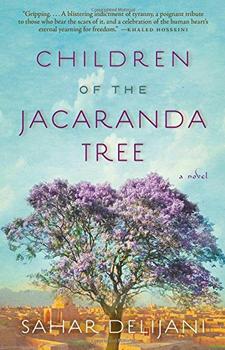Page 4 of 6
There are currently 37 member reviews
for Children of the Jacaranda Tree
-
Susan R. (Julian, NC)
Fantastic Debut Novel
Sahar Delejani has written a fantastic novel. It is gritty and emotional and hard to read due to the subject matter. At the same time it is uplifting and shows hope for a brighter future for Iran. The characters were well written and unforgettable -- I will be thinking about Neda, Omid and Sheida for a long time. They all managed to overcome the upheaval of their young lives and become protestors in a new wave of protests in their country. This is a novel that I will highly recommend.
-
Toby S. (Seattle, WA)
I'm stunned by this book and extremely moved
Only rarely have I experienced in a book such pain and horror while at the same time experiencing such beautiful writing. The author, Sahar Delijani has written a novelized version of 3 generations of her family in Tehran, Iran.
Starting with the imprisonment and execution of some of her family members in 1983 in Evin Prison the author proceeds through two more generations until some of the third generation members of the family have emigrated to other countries by 2011.
Past and present are intertwined in extremely moving and vivid prose. Unbearable secrets are gradually revealed to the younger generations. I have read many books dealing with the worst world situations (Soviet Union, China, Nazi Germany, Rwanda and more) and can only be grateful that writers such as Sarah Delijani are brave enough to enlighten me of the horrors that exist in so many places.
I highly recommend "Children of the Jacaranda" although it is so painful to read. I often needed to take a break with tears in my eyes although I couldn't NOT finish it! This is a first-rate fictionalized memoir.
-
Laurie B. (Jacksonville, FL)
Well done, not a light read
Powerful story with interesting characters. Among other things demonstrates how we are more alike than different despite vastly different geographic and social settings. I would recommend this book.
-
Ariel F. (Madison, WI)
Gripping debut novel
I found Children of the Jacaranda Tree to be a gripping story of what happened in the Iranian revolution after the Shah was over thrown. I felt that while this was a novel, the author based it on what she had really heard that had happened to either family members or friends.
It was challenging reading due to some of its emotional content, beginning with a mother going into labor in a van on the way to prison. While many of the characters in the novel lived in fear, they were determined to make a good in spite of everything.
I would recommend this book to book clubs as a good discussion book.
-
Caroline R. (New Canaan, CT)
Children of the Jacaranda Tree
This is a multi-generational story about the inhumane and tragic treatment of people in post-revolutionary Iran. The presence of so many characters and so much suffering made it difficult to follow at times. I liked that the story started and ended with Neda with a spark of hope...
-
Lori L. (La Porte, IN)
Children of the Jacaranda Tree
Although this is a deeply sad book, I did enjoy it. It reminded me, in a way, of "The Kite Runner" in that it offered insight into the lives of individuals living under a brutal, repressive regime in the Middle East. The only thing lacking in this book was a sense of what life was like prior to the beatings, imprisonments, torture and death, so we know what the revolutionaries were fighting for. I would recommend this book to book clubs, particularly those with an interest in other cultures or historical fiction.
-
Sharon B. (Rome, GA)
Unintended Consequences
This is a novel about some of the children of imprisoned revolutionaries from the Iranian revolution when the Ayatollah Khomeini and his extreme Islamic followers seized power after the overthrow of the Shah. Apparently based on some of the experiences of the author's own family (she was born in 1983 in Iran, the same year as some of the characters), it describes in heartbreaking detail the consequences of a revolution that does not turn out as expected, even to some of the participants. Children being raised by grandparents while the parents are imprisoned, losing parents to mass executions, and being separated from early caregivers when the parents are released and choose to flee the country – all of these events leave scars that must be dealt with. Although well written and beautifully descriptive, this was a hard book to read, full of sadness and oppression and sorrow for a once-great country that is now a place of violence, fear and religious extremism.
